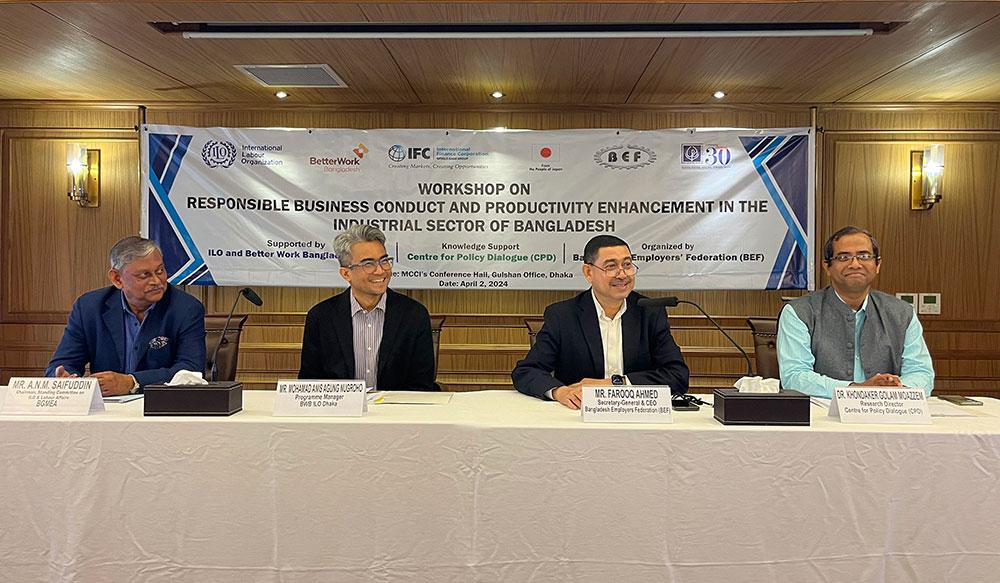
The Centre for Policy Dialogue (CPD), in partnership with Better Works Bangladesh (BWB), International Labour Organization (ILO) and Bangladesh Employers Federation (BEF), organised a workshop titled ‘Responsible Business Conduct and Productivity Enhancement in the Industrial Sector of Bangladesh’ on Sunday, 2 April, 2024. Previously, a similar workshop was organised that focused on exploring the concept of Responsible Business Conduct (RBC) with the goal of disseminating crucial information about RBC to workers’ organisations and eliciting valuable insights from their representatives. In contrast, this subsequent workshop aimed to furnish comprehensive guidelines for all industries to embrace and implement RBC principles. Its purpose was to equip employers with knowledge while soliciting insights and recommendations from them.
The workshop was attended by 56 participants, representing multiple employers’ associations, business entities, factory owners, as well as officials from CPD, ILO, BWB and BEF.
In his introductory remarks, Mr Farooq Ahmed, Secretary-General & CEO at Metropolitan Chamber of Commerce and Industry (MCCI) and BEF said ‘RBC has become a ubiquitous topic of discussion. While Bangladesh has recently initiated efforts in this area, many other countries have surged ahead. To uphold our global competitiveness, it is crucial that we actively engage in addressing RBC. In the current business landscape, compliance with RBC standards is not just advisable but essential.
In his keynote presentation, Dr Khondaker Golam Moazzem, Research Director, CPD, discussed the background of RBC. He elaborated that RBC is an umbrella concept that includes all the practices of Corporate Social Responsibility (CSR), decent employment, abolition of child labour and minimum wage. He discussed some notable guidelines of ‘Tripartite declaration of principles concerning multinational enterprises and social policy (MNE Declaration)’, ‘United Nations Guiding Principles on Business and Human Rights (UNGPs)’, ‘Organisation for Economic Co-operation and Development (OECD) Guidelines for Multinational Enterprises’, ‘Ratifications of ILO Conventions by Bangladesh’ and ‘The Corporate Sustainability Due Diligence Directive (CSDDD)’. He also discussed how these guidelines have instruments to ensure RBC.
Mr Hasnat M Alamgir, Ph.D, Director, Career & Professional Development Services and Professor, Department of Pharmacy Southeast University, shed light on stakeholders’ capacity in implementing Responsible Business Conduct (RBC) in Bangladesh. He highlighted that the challenges in implementation arise from deficiencies in policy and institutions, gaps in legal and regulatory frameworks, and obstacles in certification and oversight processes.
‘Conflicting policies and unclear jurisdictional boundaries between ministries exacerbate the challenges in enforcing Responsible Business Conduct (RBC).’ underscored the Professor. Moreover, the judicial system, including labour courts, grapples with substantial backlogs, leading to delays in resolving labour grievances. Furthermore, certification agencies in Bangladesh lack comprehensive coverage of Responsible Business Conduct RBC.
‘Bangladesh has made significant strides in promoting RBC in recent years, particularly in industries like garments and textiles, where initiatives have been taken to improve working conditions, ensure fair wages, and address environmental concern’ said the Programme Manager of Better Works Bangladesh, Mr Mohamad Anis Agung Nugroho.
Mr ANM Saifuddin, Chairman, Standing Committee on ILO & Labour Affairs, Bangladesh Garment Manufacturers and Exporters Association (BGMEA) said ‘The adoption of RBC traces back to the pivotal moment when we put an end to child labour in the RMG industry. It marked the beginning of our journey towards embracing RBC principles.’
After the keynote presentations, participants took part in an online quiz and a question-and-answer session, fostering interactive engagement and the exchange of opinions and insights. They also participated in open discussions on legal and regulatory issues, institutional challenges, and operational concerns pertaining to employers and workers.
By the end of the workshop, the participants gained knowledge and better understanding of RBC, and had explored potential solutions to the current challenges.



